- Home
- Donis Casey
Valentino Will Die Page 12
Valentino Will Die Read online
Page 12
A uniformed maid greeted Bianca at the front door and ushered her through the house and out to a deep veranda shaded by a vine-draped trellis. Pola was seated at small round table covered with a white cloth. A silver coffeepot and a china platter of scones were placed enticingly on top, as yet untouched. It was a perfect setting on a perfect sun-drenched day. Pola stood up as Bianca approached. The actress was dressed head to toe in black, her dark hair completely covered with a black scarf. Her face was so pale that Bianca wondered if she was wearing greasepaint. The only color on her person was the bright red of her lips and fingernails. Her large blue-gray eyes were without makeup and seemed sunken. She really does look sad, Bianca thought. She reminded herself that Pola was a very good actress.
Pola waved Bianca toward a chair at the table. She didn’t bother with pleasantries. “What do you want, Bianca?”
Bianca had always had some trouble understanding Pola’s English. Pola’s voice was low-pitched, and she had a heavy Polish accent. In fact, they understood one another better if they spoke French. Pola hadn’t been in the United States very long, just since 1923, when director Ernst Lubitsch had brought the well-known European actress to Hollywood. Since Pola hadn’t beat around the bush, neither would Bianca. She said,“Avez-vous volé le journal de Rudy?”
Pola had not expected to be accused of theft in the space of a minute. “What! You accuse me of taking my darling’s journal?”
“Pola, when I saw Rudy for the last time in New York, he told me to retrieve his diary and read it, and he told me exactly where he kept it, in the drawer of his bedside table. Luther told me that you are the only person who has been inside Falcon Lair since Rudy died. He said that he has not even let the maids inside to clean. Yesterday, I was allowed to go in to retrieve the diary, but it is not there. You are the only person who could have moved it. Did you take it? It is important, Pola. We must find that diary.”
She had been speaking French, but it might as well have been Swahili to judge by Pola’s reaction. “What?” she repeated. “Porquoi? Porquoi? Why would he tell you? Why would he tell you anything? Why do you care about this journal? My beloved is dead. What difference could it make now, that horrible journal? What difference does anything make now?” Her face had gone from pale to purplish-red and her eyes bulged.
Oh, my God, is she going to have a stroke? Bianca reached for Pola’s hand, but she snatched it away. “I don’t know how much you have heard about how Rudy died,” Bianca said. “Rudy did not want anyone to know, so his manager has kept his secret. Rudy was poisoned. It happened over a long period of time, so he did not know who poisoned him or how. He told me that he wrote everything in his diary, every bad thing anyone said to him, every confrontation, as well as all the good things. That journal may hold the key to who killed him, Pola. Do you have it?”
The sudden rush of color to Pola’s face faded as fast as it arose.“Empoisonné!” Poisoned. She turned ashen, her eyes rolled back, and she swayed in her chair. Bianca jumped up and grabbed her by both arms. “No fainting! Nobody is buying your act today. Did you take it?”
An expression of terror crossed the actress’s face. “But I did not know…”
Bianca couldn’t stop herself from giving Pola a good shake. “Pola, what did you do?”
Pola pushed her away. “I found it. It is true. He was dead, so I read it. I read what he said. Then I burned it.”
Bianca caught her breath. Oh, my God, she thought, now I’m going to have a stroke. “Why? What was in that book? Do not tell me that you…”
Pola burst into tears, deep, wracking, wet, snotty tears, and covered her face with a serviette. “No, no,” she wailed, switching to English. “You do not understand. I could never hurt Rudy. I loved him, truly, truly. But he did not love me. I read the newspapers, the magazines. They say I make a scene at his funeral only for publicity, but it is not true. It is the pain. I say he asked to marry me, because I think what does it matter now? Who will know or care? It was a lie. Yes, I burned the journal. I did not want anyone to know that he loved another. I am sorry. I am sorry.”
Between Pola’s wailing grief and her Slavic vowels, Bianca could barely make out what she was saying. “I did not read it all, only when I saw my name, or the names of other women. He had many women friends, but only one he loved, and it was not me.” Pola reached for a glass of water and guzzled it, dehydrated, before she continued. “His last entry, the day before he left for San Francisco…” Her face crumpled. “…the last day I saw him alive, he wrote that when his debts were paid, he would give up everything for her.”
“Who is this love of his, Pola? Did he name her? Was it Natacha?”
Pola looked away. “It does not matter now.”
Bianca sank back in her chair as Pola cried. She had been looking at poor Pola Negri the wrong way all along. She had thought Pola’s histrionics were for attention, that Pola had been using her connection to the great Valentino to enhance her own fame. But Pola was a victim of that cruelest of ironies. She had fallen in love with someone who didn’t love her back. That agony could drive anyone to behave like a fool.
“I’m the one who’s sorry, Pola. I’m sorry for my uncharitable thoughts. You really did care for him.”
“I adored him.”
“I know, hon. Sometimes love is an awful thing.” She watched Pola weep, wondering where she was going to go from here. When the tears began to abate, she said, “It’s a shame you burned the diary. That’s going to make finding Rudy’s killer much harder. I don’t mean to upset you, but perhaps this woman, this secret love, knows something about Rudy’s enemies that we don’t. Is her name Jenny?”
Pola looked surprised. “How do you…?”
Shall I tell her that Jenny is the last word I heard Rudy say before he died? Unwilling to face another flood, Bianca said, “I overheard him mention the name once. But he never spoke of her to me, or to anyone else, as far as I know.”
“Yes, in his journal he called her Jenny, a quiet, gentle girl who wanted nothing from him. He wrote that he would speak to her about the future when he returned from New York.”
Bianca could hardly contain herself. At last, a new lead. “What is her last name? Where can I find her?”
“He wrote no last name. He wrote only that he met her a few months ago, while he was working on a picture for Universal or United Artists. I do not remember which, nor do I know exactly when.”
“Thank you, Pola. I promise I won’t tell anyone what you told me.” Let her live in her fantasy and perhaps soothe her broken heart a little by pretending to be Rudy’s betrothed. What harm could it do now?
Bianca broke every rule of the road as she sped back up the hill to her estate, eager to telephone Jim Quirk and ask if he knew a Jenny who worked at Universal or maybe UA. The memory of Pola’s hysterics in New York still rankled, but her irritation was now tempered with pity. Nothing hurt like unrequited love. Damn, she was beginning to like Pola again.
~ Look who has crawled out of the Woodwork! ~
On the morning of September 14, 1926, Ted Oliver stood outside the elegant Church of the Good Shepherd on Roxbury Drive in Beverly Hills, along with hundreds of rubberneckers and press photographers, and watched the elite arrive in their limousines for Valentino’s memorial service. The whole shebang reminded him of a Hollywood premiere. Everyone who was anyone came, dressed in tasteful jewels, furs, feathers, all in fashionable variations of the color black.
He saw Bianca arrive on the arm of her Dangereuse co-star, Daniel May. May was a fine-looking young man, much closer to Bianca’s tender age than Oliver was. He had light brown hair, dark blue eyes, and a smattering of freckles that gave him an all-American, boyish look. Oliver fought down an irrational stab of jealousy. Bianca’s black cloche and drop-waist dress were both outlined with a subtle yellow piping and offset with a yellow neck scarf that added a bit of sunshine to the sad pro
ceedings.
As the pair walked toward the church, Bianca’s gaze skewed toward him and an ironic smile appeared before she and May disappeared inside. Oliver banished the thought that she could read his mind.
To his surprise, he did not see a single mobster arrive for the memorial service, at least no one that he knew. If he saw a face that he didn’t recognize, he made notes about the person’s appearance. Once or twice he asked a man with a camera and a press card tucked in his hatband if he knew who this guy or that guy was. No one more exciting than an assistant director and a scenarist, but he wrote down their names anyway. Oliver stood among the crush of onlookers outside the church for the entire two-hour service, then elbowed his way to his car to fall into the funeral procession as it wound its way from Beverly Hills to Hollywood Memorial Park, where Valentino would be laid to rest for eternity in a borrowed crypt. The screen idol had not made any provision for his own burial. Nobody was prepared to die at thirty-one.
The hired cops tried to toss Oliver out of the procession, of course. His jalopy didn’t fit in with all the Rolls-Royces and Hispano Suizas. But he had a perfectly valid invitation to the crypt-side service, which he swore he hadn’t stolen, and George Ullman himself had verified, so they had no choice but to let him bring up the rear. The line of celebrity vehicles was so long that the service was already beginning by the time the last cars were parked in the makeshift lot by the cemetery gate. Oliver had to stand to one side of the rows of white wooden chairs that had been set out for the mourners, but that suited him. He had a much better view of the illustrious crowd. He could see the back of Bianca’s head in the front row. She was comforting the veil-draped Pola Negri, whom he could hear weeping even from this distance.
Some of the people who were at the memorial service had not made it to the cemetery, but a few new faces had turned up for the burial. He straightened when he caught sight of Jack Dragna, a mobster just out of prison for extortion, and his right-hand man, Handsome Johnny Roselli. And there, sitting in the middle of the last row, having a friendly conversation with Los Angeles oil magnate Miles Donahue, was Tony the Hat. Oliver pulled his fedora low on his forehead, shading his eyes. So Dix was on the right trail. The Los Angeles mob had an unknown interest in the late, lamented Rudolph Valentino.
~ A Half-Baked Plan is Better Than No Plan At All ~
After the service was over and Valentino properly entombed in a crypt that didn’t belong to him, Oliver hung around the cemetery until the last mourner had left. The gangsters didn’t linger, and the celebrities and movie folk trickled out at their own pace, some taking the opportunity to talk to agents and producers and make a few deals while they had the opportunity. The last to leave were June Mathis, Mary Pickford, and Bianca LaBelle, supporting a stumbling Pola Negri between them. Bianca surely saw him standing solitary behind the now-empty chairs, but she did not cast him a glance as the women made their way toward the gate.
Oliver left Hollywood Memorial Park and drove directly to Pasadena to talk to Dix. He did not telephone beforehand. He did not stop by his own place to change, even though his shirt was wet with flop sweat. He was afraid that if he hesitated, he’d start thinking, and if he started thinking, he’d decide that his plan might be bold, but it was also dangerous.
He was stopped at the gate of Dix’s manse, as he expected, but he managed to talk the guard into notifying Dix that he wanted to see her. He could hear her lilting voice over the intercom speaker. “Certainly. Let him in.” She sounded amused.
Dix’s goon made him get out of the auto and frisked him so thoroughly that Oliver thought he might as well just go ahead and do a cavity search. Then the pervert wouldn’t let him get back behind the wheel.
“You walk,” the guy grunted. “I’ll park this heap.”
So Oliver walked the fifty yards to the front door, where another goon patted him down one more time before letting him step inside.
Dix herself was walking down the hall toward the foyer to meet him. Goon number three, the one Oliver called Juan, glided along behind her.
He scooped off his hat when she halted in front of him. Oliver wasn’t the tallest man, but the old woman barely came up to his shoulder. “Well,” she said, delighted, “you have shaken loose some new information for me already?”
“I’d like to say that I’m a brilliant investigator, but you’re the one who had the right hunch. Guess who I saw among the bereaved at Valentino’s burial, looking like the cat who ate the canary?”
“This sounds promising. All right, let’s go back to my sitting room.”
She led the way and Oliver followed. Juan brought up the rear. Oliver could feel the heat of his malevolence behind him.
Dix settled into her usual armchair and Oliver into his usual spot across the room. Juan took his place next to the potted palm in the corner and faded from existence.
Tea was already on the table, and Dix poured Oliver a cup without asking if he wanted one. He leaned forward to take the pink-flowered cup from her hand before launching into his spiel. “Cornero was at the burial, along with Jack Dragna and his boy Johnny Roselli.”
“Indeed! Three bootleggers. Dragna did a stint up the river for blackmail. Maybe he’s up to his old tricks.”
“They were the only hoods that I recognized. Dragna and Roselli kept to themselves, but Cornero sat at the back during the internment and had a nice conversation with Miles Donahue.”
Dix’s eyebrows shot up. “Miles Donahue? The oilman?”
“The same. Him and Cornero jawed quite a lot, which surprised me. All I know about Donahue is that he’s a big oil magnate and philanthropist and he’s rich as Midas. As far as I know, he’s an upstanding citizen. I’ve never heard that he’s into anything shady, so why pass the time of day with somebody like Tony the Hat?”
Dix did not look surprised. “Nobody who is rich as Midas is an upstanding citizen, Ted. Donahue is just better at hiding it than some. He and I have never done business, but I know for a fact that he acquired most of his mineral rights through means most unbecoming.” She flashed a dimple. “I had heard that he was interested in becoming involved in the entertainment industry. There’s a plan afoot by some of the big studios to corner the film distribution market across the country, to make theater owners lease films by the bundle—five dud movies for every blockbuster they want to show. Should be most lucrative. I’ve invested in it myself. Of course if Donahue’s hobnobbing with Tony the Hat, he may be looking to get into liquor smuggling or the offshore casino business. I wonder what this has to do with Valentino? Who else did they talk to? Dragna?”
“I didn’t see Cornero talk to anyone else. He left as soon as the ceremony was over. Still, why was Dragna there at all? He had his factotum Roselli with him.”
“Oh, these Italians.” Dix gave a dismissive wave. “They’re all connected in one way or another. Dragna is a heroin smuggler, among other enterprises. Maybe Valentino was a customer.”
“Didn’t Dragna do time for extortion?”
“He did. That was over ten years ago, though. He tried to get that Black Hand nonsense started out here on the West Coast, but all it got him was three years in the slammer. Since then he’s been mostly involved in drugs and gambling.”
The Black Hand. Oliver had told Bianca that the Black Hand was old news. Maybe it was. And maybe Jack Dragna was up to his old tricks.
“What about Donahue?” Dix said. “Did he say anything to Dragna?”
“Donahue had a few words with several people, mostly, ‘Hi, how are you?’ and ‘Ain’t it a shame about the Sheik?’ If he talked to Dragna, I didn’t see it. He did spend a few minutes head-to-head with Valentino’s manager, George Ullman. The skinny is that Ullman has been named executor of Valentino’s estate.”
Dix raised an eyebrow. “Not the brother?”
“Apparently not. The brother was there, though.”
�
��What were Donahue and Ullman talking about?”
“Donahue may have been talking to him about the disposition of the estate, trying to get some sort of charitable donation. That would be up his alley. I don’t really know. I couldn’t get close enough to hear much.”
Dix nodded. “Who else was there that I should know about?”
“Like I said, everybody who’s anybody was there. If I’d had an autograph book with me, I could have filled it up lickety-split and sold it for a fortune. Ullman and Alberto Valentino and their wives were in the first row, next to the crypt, along with June Mathis and Pola Negri, who sobbed so loud you could hardly hear the padre. Negri fainted a couple of times, too, much to the delight of the photographers. Chaplin was there, and Pickford and Fairbanks, Gloria Swanson and that guy from Massachusetts she’s been dating, name of Kennedy, I think. All the broads Valentino did movies with, Bianca LaBelle and Vilma Bánky Alice Terry, and Agnes Ayers. I saw Will Rogers and Sam Warner. Jean Acker, Valentino wife number one, was in the crowd. I stood way off to the side, next to a photographer for the Beacon, who pointed out some of Valentino’s servants and a couple of his writer and musician friends whose faces I didn’t know. I only recognized a couple of the names he said—Louella Parsons and James Quirk. Looking for copy, I expect.”
Dix placed her cup on the side table. “Forget about the actors for the moment. I want you to find out if and how Miles Donahue or Jack Dragna are involved with Cornero. Rum running or gambling or something else.”
“You think one of them might be trying to horn in on Cornero’s business?”
She shrugged. “Maybe.”
“And you want to know who your competition is?”
Her dimple reappeared. “Maybe.”
“Can you get me on the Monaco as soon as possible? Set me up as a fat cat gambler from Seattle with a wad to blow and maybe a yen to invest in the flicks.”
“Consider it done,” Dix said.

 The Wrong Girl
The Wrong Girl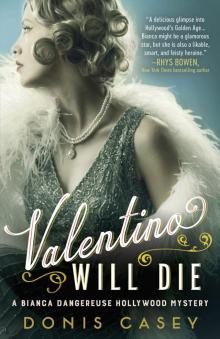 Valentino Will Die
Valentino Will Die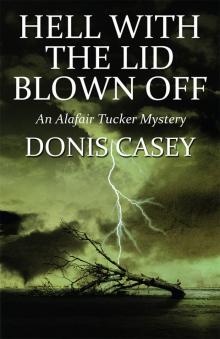 Hell With the Lid Blown Off
Hell With the Lid Blown Off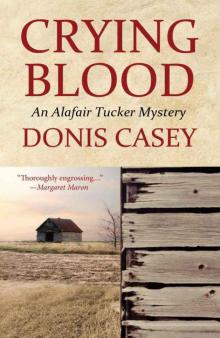 Crying Blood - An Alafair Tucker Mystery
Crying Blood - An Alafair Tucker Mystery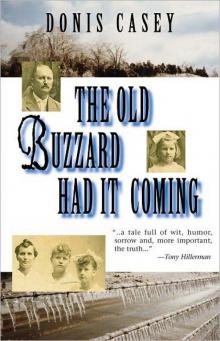 The Old Buzzard Had It Coming: An Alafair Tucker Mystery
The Old Buzzard Had It Coming: An Alafair Tucker Mystery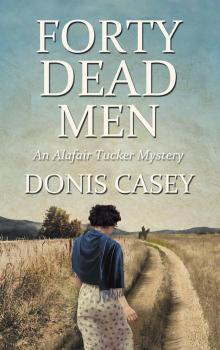 Forty Dead Men
Forty Dead Men All Men Fear Me
All Men Fear Me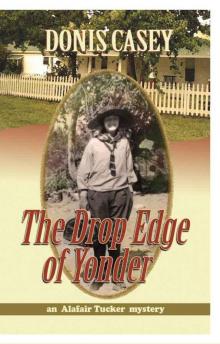 The Drop Edge of Yonder - An Alafair Tucker Mystery
The Drop Edge of Yonder - An Alafair Tucker Mystery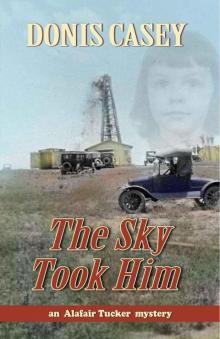 The Sky Took Him - An Alafair Tucker Mystery
The Sky Took Him - An Alafair Tucker Mystery Hornswoggled - An Alafair Tucker Mystery
Hornswoggled - An Alafair Tucker Mystery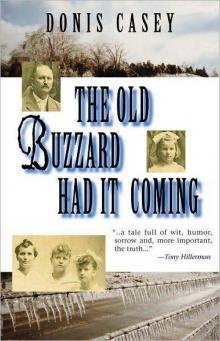 The Old Buzzard Had It Coming
The Old Buzzard Had It Coming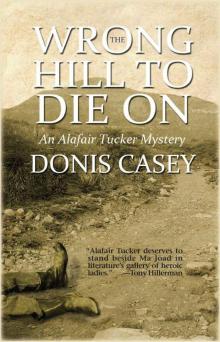 The Wrong Hill to Die On: An Alafair Tucker Mystery #6 (Alafair Tucker Mysteries)
The Wrong Hill to Die On: An Alafair Tucker Mystery #6 (Alafair Tucker Mysteries)